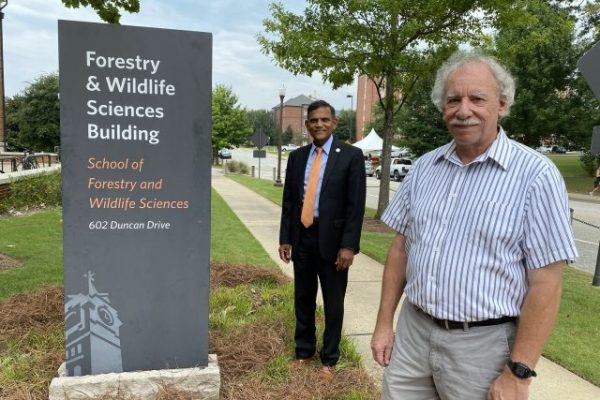Auburn University alumnus Christoph Stuhlinger has established the H. Christoph Stuhlinger Fund for Excellence in Support of Urban Forestry, an endowment to further urban forestry initiatives in the School of Forestry and Wildlife Sciences.
“The purpose for establishing and endowing this fund is to raise awareness and encourage students to include urban forestry and arboriculture-related courses in their curriculum of study,” said Stuhlinger, who received a bachelor’s degree in forest management in 1980 from what was then the Department of Forestry in the School of Agriculture.
“Better yet, a more formal program or curriculum path in urban forestry, such as a minor, certificate or similar option should become available,” Stuhlinger said.
A native of Huntsville, Alabama, Stuhlinger earned a master’s degree in forestry from Louisiana State University, where he worked for several years as a research associate. In 1987, he joined the Maryland Department of Natural Resources-Forest Service, working in the Baltimore area for more than 16 years as a watershed and county forester and urban forester.
In 2003, Stuhlinger became the university system forester at the University of Arkansas’ Division of Agriculture/Arkansas Forest Resources Center, where he oversaw the sustainable management of the university’s 13,400 acres of forestlands statewide, conducted applied research and coordinated field days and workshops focused on both rural and urban forestry and tree care activities.
He retired from that position in 2018 and returned to his hometown, where he is a volunteer at the Huntsville Botanical Garden and an instructor for the Osher Lifelong Learning Institutes, or OLLI, program through the University of Alabama in Huntsville.
An International Society of Arboriculture certified arborist since 2000, Stuhlinger was a member of the Arkansas Urban Forestry Council’s board of directors from 2004 to 2017. He also chaired the Monticello Tree Board and was a member of the UA-Monticello Tree Board.
When Stuhlinger studied at Auburn and LSU in the late 1970s and early 1980s, most forestry schools focused only on traditional forestry. Though urban forestry and arboriculture had been practiced for a long time, there were few formal study programs centered on those fields.
In Maryland and Arkansas, his on-the-job training in urban forestry and arboriculture taught him about the importance of managing trees in communities. He said he believes today’s forestry and natural resources students need a basic understanding of urban and community forestry, or UCF, which includes the wildland-urban interface, or WUI.
“Students may not fully understand other values of trees and forests and their management challenges, especially in urban and urbanizing environments. Some unique management skills are required for trees growing in a UCF environment,” he said, adding that about 80 percent of U.S. citizens live, work and play in a UCF environment.
Increasing populations and urbanization will cause more forest loss, making the proper management of urban forests even more important and making basic knowledge of managing trees in those areas essential. He said that is why existing forestry programs need to include educational opportunities for students who are interested in urban forestry and arboriculture.
“Students should have at least some basic knowledge of UCF/WUI issues to help prepare them for emerging resource management problems, and to build links with urban populations,” Stuhlinger said. “Well-rounded forestry students should also have some basic arboricultural skills.”
Janaki Alavalapati, dean of the School of Forestry and Wildlife Sciences, said the funding is well-timed.
“As urbanization is increasingly on the rise, the need for more forestry students to pursue careers in urban forestry and arboriculture is significant,” Alavalapati said. “Chris Stuhlinger’s generous gift will allow the school to contribute to the maintenance and care of healthy urban trees and all the benefits that they provide.”
Heather Crozier, the school’s development director, said the endowment will contribute to urban forestry growth within the school in numerous ways.
“The primary goal of the Fund for Excellence is to fund an annual undergraduate scholarship to an urban forestry student,” Crozier said. “If no students qualify for a scholarship in a given year, the funds will support the school’s urban forestry research, conferences, career promotion, visits from guest experts and other ventures, as determined by Dean Alavalapati.”
Stuhlinger said he is encouraged that Alavalapati and the school are willing to enhance the new program with the additions of a minor and certificate in urban forestry. Work is underway to create and add these two options.
“I have been very pleased with how well my endowment and proposal to enhance urban forestry at the Auburn School of Forestry and Wildlife Sciences has been received,” he said. “I am very happy to know that they agree with me about the importance of including urban forestry in their students’ education.”
(Written by Teri Greene)











